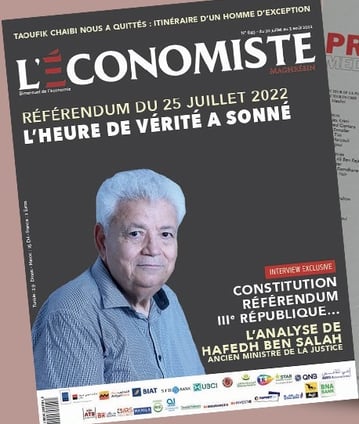Interview Hafedh Ben Salah
Hafedh Ben Salah: “A good Constitution must properly organize the limitation of powers.”
NEWS
10/10/20234 min read


2022/07/24 AT 10:23
Hafedh Ben Salah needs no introduction. A brilliant academic, former dean of the Faculty of Law in Tunis, former Minister of Justice, and a lawyer, he is a well-respected figure. Therefore, we found it highly valuable to interview him just days before the July 25, 2022, referendum on the new Constitution submitted for approval by the Tunisian people.
With precise and relevant insights, Hafedh Ben Salah extensively discussed not only the new Constitution but also the broader constitutional history of our country, analyzing the fundamental laws that preceded the one set to be voted on in the coming days, including the 2014 Constitution, which failed to achieve its goals. However, he noted that it could be corrected, as it included sufficient procedures for this purpose. In fact, he asserts, the issue lies in a certain willingness to respect the Constitution and view it as a supreme text that applies to all. Nevertheless, many questions have been raised: the fragility of the constitutional framework, legal security, the role of political parties in the new Constitution, the electoral system, the new Assembly of Regions and Districts… Interview.
Hafedh Ben Salah, former Minister of Justice, is there a need to change the 2014 Constitution? Was it so inconsistent, unable to organize political life, ensure stability, and guarantee a true separation of powers? Or was it the politicians' fault for not adhering to the Constitution's implementation?
We have the right to ask the following question: Is there a need for a new Constitution? This leads us to examine the 2014 Constitution, especially the conditions under which it was drafted and adopted. How do we generally assess a Constitution? In my opinion, two important parameters should be considered. First, how does the Constitution organize the control of powers? Does it effectively limit the exercise of power? This question is related to the expansion and guarantee of freedoms, particularly individual freedoms. The 2014 Constitution limits powers by separating them and organizing the reciprocal means of action and reaction between the branches of power. Secondly, it organizes the peaceful transition of power. Unfortunately, on this front, the Constitution was not drafted in a rigorous and serene manner, as the main movements that constitute the major components of society were not respected.
Are you suggesting that in 2014, a prime minister should have been appointed from the leading party, Nidaa Tounes?
Exactly. Nidaa Tounes had a significant relative majority with 86 deputies and could therefore appoint a prime minister from its party. President Béji, who was also the president of Nidaa Tounes, chose to appoint a technocrat.
Could Nidaa Tounes have done so, even with a relative majority?
Yes. Nidaa Tounes should have done so out of respect for the Constitution. It was precisely about giving meaning to the democratic process. It was also out of respect for the voters that the party should have done so. This was not the case. That said, the 2014 Constitution did not achieve its objectives, as it failed to ensure the proper functioning and, most importantly, the continuity of the institutions.
Thus, we are surprised by the fragility of the established structures. In the end, nothing withstood, at this level, a certain transgression.
Is this due to the absence of a Constitutional Court?
Certainly. But that's not all. When we look back at the 2014 Constitution, we find a delicate balance between the different branches of power, which is almost problematic. There is a meticulous distribution of powers between the two heads of the executive. For example, national security is in the hands of the head of government, while national defense is under the head of state.
This is to prevent any abuse or overreach. But in the end, we ended up with an overwhelmed Constitution, without any protection.
But this was partly due to the former head of state, Béji Caïd Essebsi, who seemed to want to restore a presidential system.
I think the former head of state was trapped because, at the end of his term, after losing all collaboration with the head of government, he was left powerless. I believe he fell into another pitfall: he could do nothing, despite all the prerogatives he had.
The 2014 Constitution did not rule out situations of tough coexistence between the two heads of the executive, resulting in institutional paralysis and repeated crises.
When it was drafted, the 2014 Constitution aimed to give a prominent role to political parties. The idea was to have blocs that could either support or oppose each other in a healthy and regular manner. The dual leadership of the executive, I believe, greatly underestimated the problems that could arise from this dichotomy. It was perhaps assumed that the head of state would allow the government to function while focusing on ceremonial duties, even though, in reality, he has more legitimacy than the government because he is elected by universal suffrage. Moreover, the government was not a political government.
The Constitution did not take into account the forces at play and was not perceived as a supreme text that must be respected. Consequently, there were transgressions that went unpunished. Very quickly, the Constitution was forgotten, and compromises were made.
Interview conducted by Hédi Mechri and Mohamed Gontara
To read more, find the full article in the print edition of Economiste Maghrébin No. 849 from July 20 to August 3, 2022.
